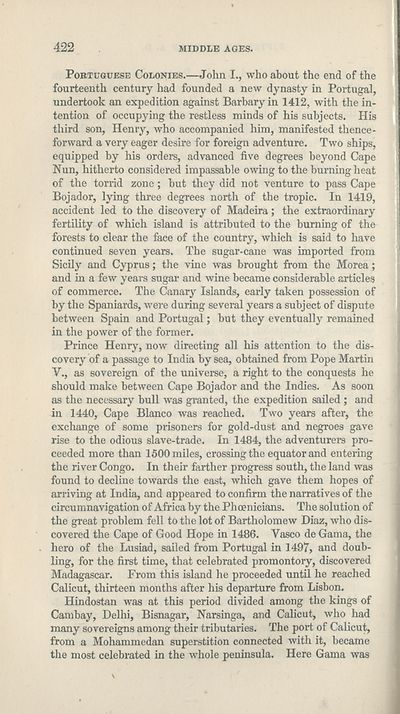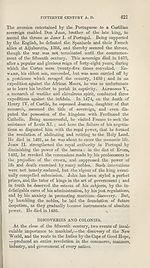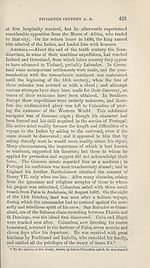Download files
Complete book:
Individual page:
Thumbnail gallery: Grid view | List view

422
MIDDLE AGES.
Portuguese Colonies.—John I., who about the end of the
fourteenth century had founded a new dynasty in Portugal,
undertook an expedition against Barbary in 1412, with the in¬
tention of occupying the restless minds of his subjects. His
third son, Henry, who accompanied him, manifested thence¬
forward a very eager desire for foreign adventure. Two ships,
equipped by his orders, advanced five degrees beyond Cape
Nun, hitherto considered impassable owing to the burning heat
of the torrid zone; hut they did not venture to pass Cape
Bojador, lying three degrees north of the tropic. In 1419,
accident led to the discovery of Madeira; the extraordinary
fertility of which island is attributed to the burning of the
forests to clear the face of the country, which is said to have
continued seven years. The sugar-cane was imported from
Sicily and Cyprus; the vine was brought from the Morea;
and in a few years sugar and wine became considerable articles
of commerce. The Canary Islands, early taken possession of
by the Spaniards, were during several years a subject of dispute
between Spain and Portugal; but they eventually remained
in the power of the former.
Prince Henry, now directing all his attention to the dis¬
covery of a passage to India by sea, obtained from Pope Martin
V., as sovereign of the universe, a right to the conquests he
should make between Cape Bojador and the Indies. As soon
as the necessary bull was granted, the expedition sailed ; and
in 1440, Cape Blanco was reached. Two years after, the
exchange of some prisoners for gold-dust and negroes gave
rise to the odious slave-trade. In 1484, the adventurers pro¬
ceeded more than 1500 miles, crossing the equator and entering
the river Congo. In their farther progress south, the land was
found to decline towards the east, which gave them hopes of
arriving at India, and appeared to confirm the narratives of the
circumnavigation of Africa by the Phoenicians. The solution of
the great problem fell to the lot of Bartholomew Diaz, who dis¬
covered the Cape of Good Hope in 1486. Vasco de Gama, the
hero of the Lusiad, sailed from Portugal in 1497, and doub¬
ling, for the first time, that celebrated promontory, discovered
Madagascar. From this island he proceeded until he reached
Calicut, thirteen months after his departure from Lisbon.
Hindostan was at this period divided among the kings of
Cambay, Delhi, Bisnagar, Narsinga, and Calicut, who had
many sovereigns among their tributaries. The port of Calicut,
from a Mohammedan superstition connected with it, became
the most celebrated in the whole peninsula. Here Gama was
MIDDLE AGES.
Portuguese Colonies.—John I., who about the end of the
fourteenth century had founded a new dynasty in Portugal,
undertook an expedition against Barbary in 1412, with the in¬
tention of occupying the restless minds of his subjects. His
third son, Henry, who accompanied him, manifested thence¬
forward a very eager desire for foreign adventure. Two ships,
equipped by his orders, advanced five degrees beyond Cape
Nun, hitherto considered impassable owing to the burning heat
of the torrid zone; hut they did not venture to pass Cape
Bojador, lying three degrees north of the tropic. In 1419,
accident led to the discovery of Madeira; the extraordinary
fertility of which island is attributed to the burning of the
forests to clear the face of the country, which is said to have
continued seven years. The sugar-cane was imported from
Sicily and Cyprus; the vine was brought from the Morea;
and in a few years sugar and wine became considerable articles
of commerce. The Canary Islands, early taken possession of
by the Spaniards, were during several years a subject of dispute
between Spain and Portugal; but they eventually remained
in the power of the former.
Prince Henry, now directing all his attention to the dis¬
covery of a passage to India by sea, obtained from Pope Martin
V., as sovereign of the universe, a right to the conquests he
should make between Cape Bojador and the Indies. As soon
as the necessary bull was granted, the expedition sailed ; and
in 1440, Cape Blanco was reached. Two years after, the
exchange of some prisoners for gold-dust and negroes gave
rise to the odious slave-trade. In 1484, the adventurers pro¬
ceeded more than 1500 miles, crossing the equator and entering
the river Congo. In their farther progress south, the land was
found to decline towards the east, which gave them hopes of
arriving at India, and appeared to confirm the narratives of the
circumnavigation of Africa by the Phoenicians. The solution of
the great problem fell to the lot of Bartholomew Diaz, who dis¬
covered the Cape of Good Hope in 1486. Vasco de Gama, the
hero of the Lusiad, sailed from Portugal in 1497, and doub¬
ling, for the first time, that celebrated promontory, discovered
Madagascar. From this island he proceeded until he reached
Calicut, thirteen months after his departure from Lisbon.
Hindostan was at this period divided among the kings of
Cambay, Delhi, Bisnagar, Narsinga, and Calicut, who had
many sovereigns among their tributaries. The port of Calicut,
from a Mohammedan superstition connected with it, became
the most celebrated in the whole peninsula. Here Gama was
Set display mode to:
![]() Universal Viewer |
Universal Viewer | ![]() Mirador |
Large image | Transcription
Mirador |
Large image | Transcription
| Antiquarian books of Scotland > Education > Elements of universal history on a new and systematic plan > (442) |
|---|
| Permanent URL | https://digital.nls.uk/127585444 |
|---|
| Description | Thousands of printed books from the Antiquarian Books of Scotland collection which dates from 1641 to the 1980s. The collection consists of 14,800 books which were published in Scotland or have a Scottish connection, e.g. through the author, printer or owner. Subjects covered include sport, education, diseases, adventure, occupations, Jacobites, politics and religion. Among the 29 languages represented are English, Gaelic, Italian, French, Russian and Swedish. |
|---|

